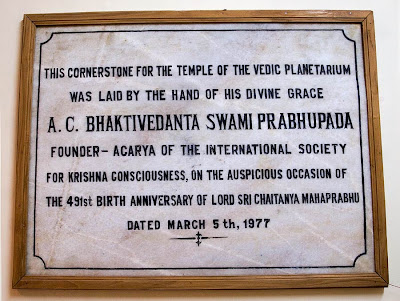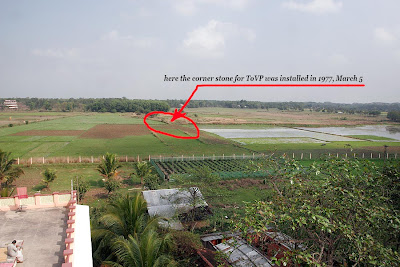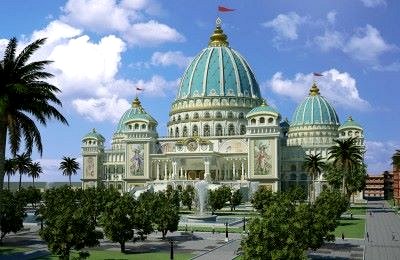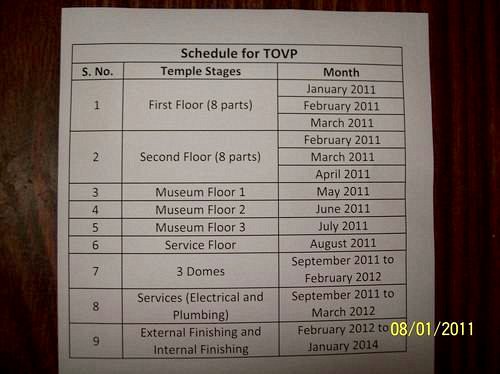"The Week" Magazine, March 2004 (India)
Man Of The Week
Alfred Ford: Henry Ford's great-grandson wants to build a Rs 600-crore Vedic city in India
By Tapash Ganguly, Mayapur, March 20, 2004
 .
.Alfred Ford (Ambarisa Das)
If
Henry Ford left his legacy in motor cars, his great-grandson Alfred Ford is chasing a spiritual dream: to build a Vedic city in India. The only hurdle in his path is a stoic West Bengal government, which is reluctant to be a strategic partner in the Rs 600-crore project. Three London-based firms have submitted designs of the Vedic city, which Alfred Ford has planned for Mayapur in Nadia district. Mayapur, the birthplace of the 16th century Vaishnava saint Sri Chaitanya Mahaprabhu, is the headquarters of the International Society for Krishna Consciousness (Iskcon), of which Alfred Ford is a member.
The CPI(M)-led government has reservations about supporting a religious project. And without the government's support Alfred Ford, chairman of Sri Mayapur Project Development Committee that promotes the Vedic township, cannot hope to realise his dream. "According to West Bengal Land Reforms Act, no charitable society can have more than 25 acres," said Bhakti Charu Swamy, a member of the society's governing council. "Iskcon already has 25 acres in Mayapur. The new project needs at least 300 acres. Local landowners are willing to sell, but we cannot buy unless the government becomes a partner in the project." The government, which has spread a red carpet for investors of all kind, could not spare time for Alfred Ford, cousin of William Ford (Jr), chief executive officer of Ford, when he arrived with his Bengali wife, Sharmila, in February. After much lobbying, Finance Minister Dr Asim Dasgupta gave Alfred an appointment but nothing came of it. Two other state governments, however, have evinced keen interest in the project. Orissa has offered 400 acres on the Puri beach, where Sri Chaitanya died at the age of 48. Uttar Pradesh Chief Minister Mulayam Singh Yadav's adviser Amar Singh has reportedly requested Albert to shift his project to Vrindavan, where Sri Chaitanya spent half his life.
Alfred Ford is a direct disciple of the Iskcon founder, Bhaktivedanta Swami Prabhupada, who died in 1977. "I first met Srila Prabhupada in 1974 and he became my spiritual master the following year," said Alfred, who took the name Ambarish Das and became a vegetarian Hindu. "His books and teachings gave a meaning and purpose to my life." The Vedic city seeks to glorify Mayapur. "We are presenting the Vedic culture as the jewel of India," said Alfred. "We are not going to use this project to convert anyone. We want to present the knowledge of the Vedas in a non-sectarian world-class project. This is spiritual technology presented in a way which is open to everyone." Alfred Ford, a trustee of the Ford Motor Company Fund, had a hand in building the first Hindu temple in Hawaii. He also helped found the Bhaktivedanta Cultural Center in Detroit, a major tourist attraction. He is the founding chairman of Iskcon Foundation and has contributed generously to the Hare Krishna movement. An arts graduate from Tulane University, Alfred started Ramayan Arts Inc., an Indian arts gallery, in 1978. He co-founded Rapport-Net, a tech company which provides communication solutions to corporates.
The Vedic city, as he has planned, will have a 50,000 sq.m cultural and educational complex called Vedic Planetarium, showing the cosmology of ancient India. A botanical garden will surround the planetarium. According to Bhakti Charu Swamy, using both modern and traditional exhibition systems the complex will provide a dynamic uplifting experience to visitors through an exploration of man's relationship with the universe. "It will be different from other cities," said Alfred Ford, who is also lobbying for a Vedic centre in Moscow. "The culture will be based on Vedic philosophy. There will be certain rules to follow for those who want to reside here because we want to keep the atmosphere clean." The design of the Vedic Planetarium has been drawn from the 'sacred architecture', in which the cosmos is revealed through the medium of the building itself. The large scale of the building with its western facade rising over 30 storeys, combined with the elaborate art and sculpture, is expected to attract visitors.
"The city will sustain itself from pilgrim and tourist revenue as well as cottage industries," said Alfred, who is in his forties. "The government can help by developing the infrastructure. Waterways, as well as rail and road systems in the region, can be developed. Such a project will enhance the image of West Bengal in the business and tourism world." A complex of hotels, restaurants and retail establishments as well as museums, theatres and other recreational facilities are also being planned. The Ganga and the Jalangi will be developed with water-based recreation activities in mind. "Service components of the project will generate direct employment and an industrial park will be developed to promote food processing, handicrafts and textiles," said Bhakti Charu Swamy. Nadia, which is widely regarded as the vegetable garden of West Bengal, is also famous for its handwoven Tant saris. "Besides, a technology park will be created for information technology businesses such as Web design and development and software development." Before conceiving the project, Alfred and his team collected data on pilgrim centres in India. Tamil Nadu and Andhra Pradesh, with their temple towns, attract a third of domestic tourists and Uttar Pradesh, with pilgrim centres for Hindus and Muslims, attracts 30 per cent.
Pilgrimage tourism is on the rise worldwide and interest in India's spiritual heritage is surging. "Mayapur commands a significant percentage of domestic and foreign tourism in West Bengal," said Shankarshan Netai, general manager of Iskcon Center, Mayapur. "In 2002 over 13 lakh people visited Iskcon Center." The number will grow manifold when the Vedic city is completed. According to Bhakti Charu Swamy, Alfred Ford will come down from Florida, where he lives with his wife and two daughters on a 200-acre farm, this October to finalise the details. By then, it will be clear whether West Bengal's loss would be Orissa's gain. If that happens Alfred Ford and his wife, whom he first met at the Iskcon temple in Melbourne, would be the saddest. "We would like to retire to the tranquillity and spiritual atmosphere of Mayapur," Alfred Ford told 'The Week'. Now, everything hinges on the government's decision
 .(Full Image)
.(Full Image)  .(Full Image)
.(Full Image) .• Video: The Thakura's Prophecy
.• Video: The Thakura's Prophecy  .(Full Image)
.(Full Image)  .(Full Image)
.(Full Image) .• Video: The Thakura's Prophecy
.• Video: The Thakura's Prophecy 





























